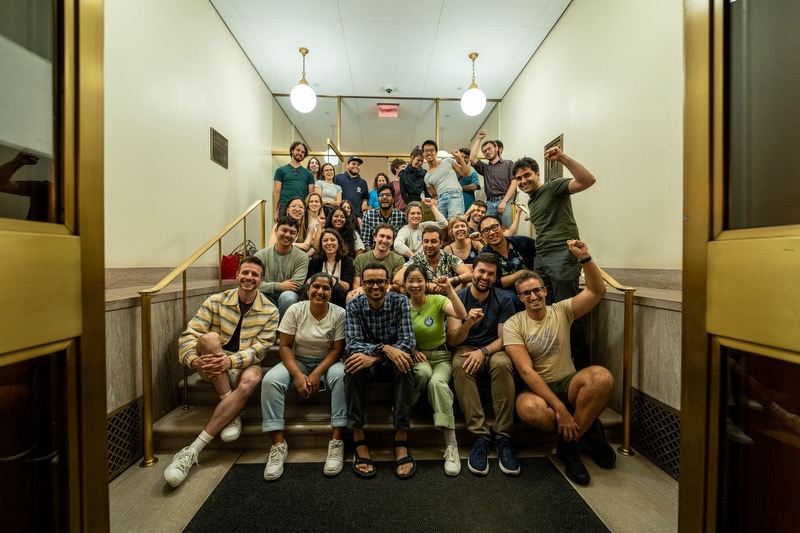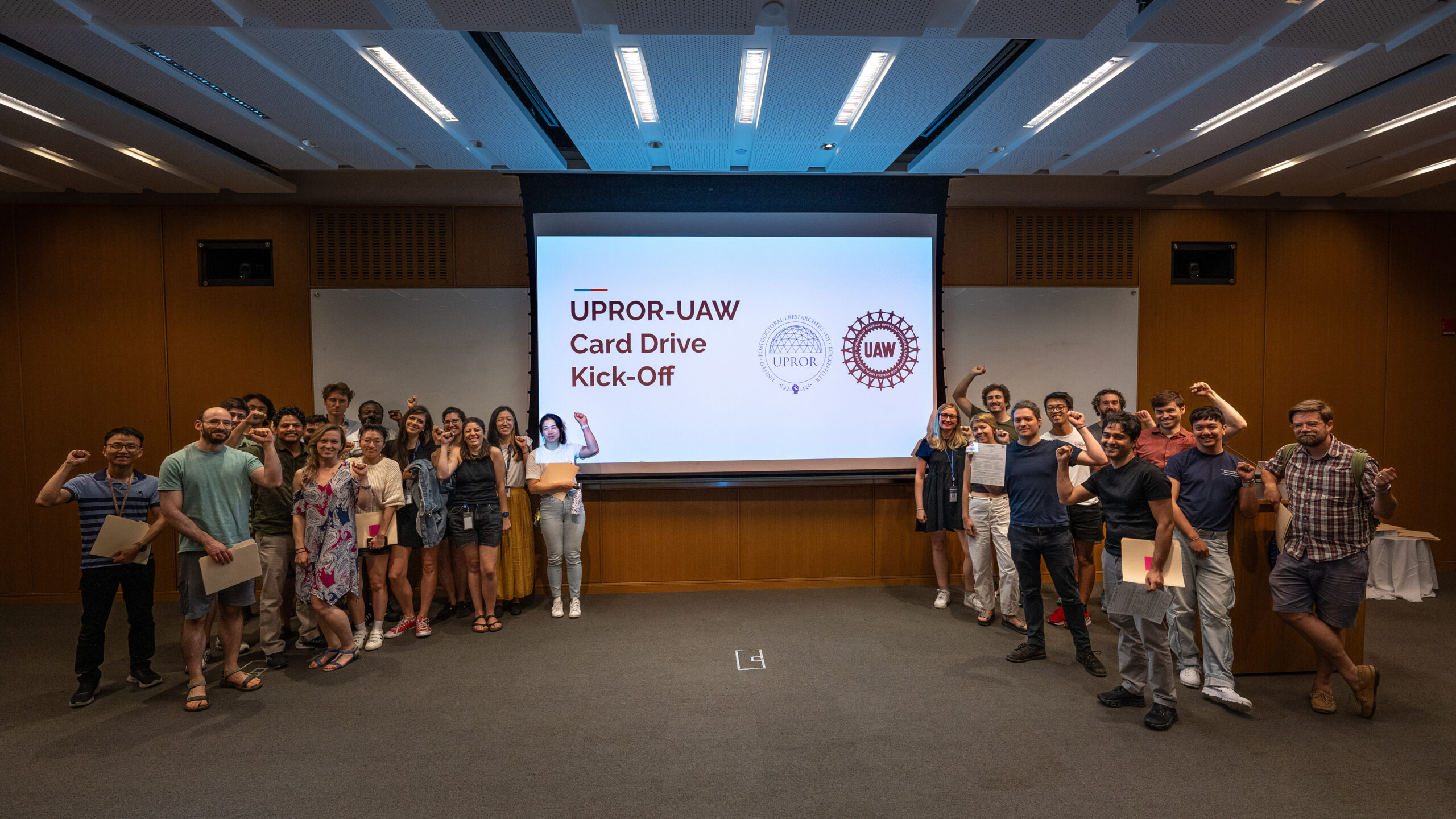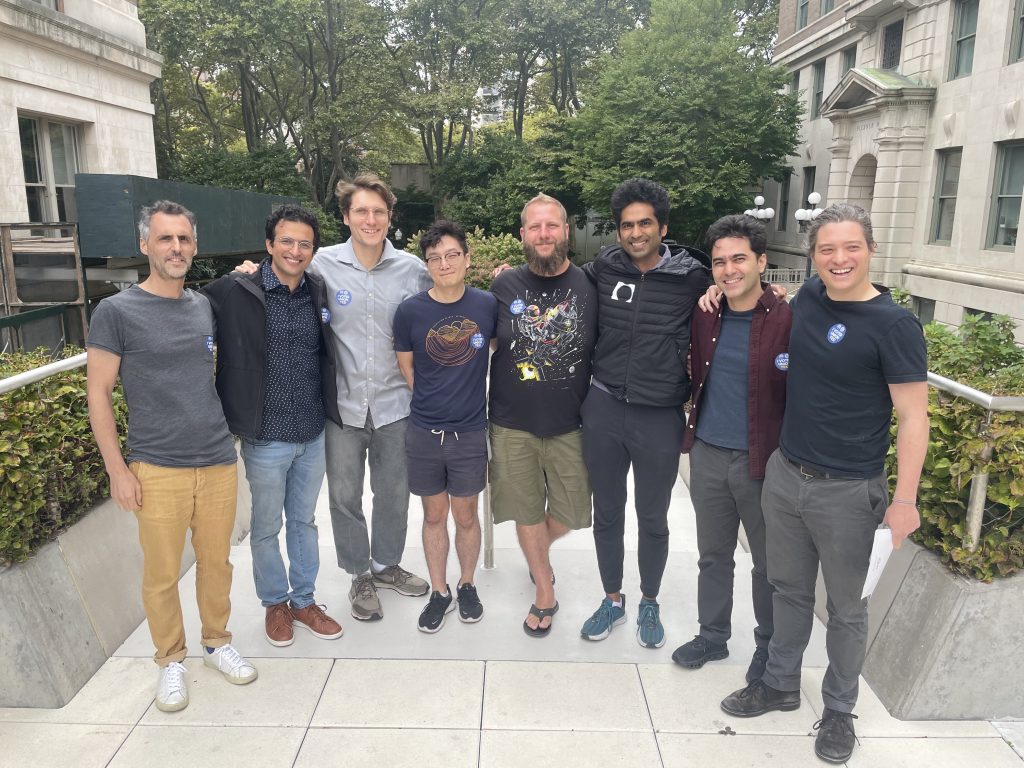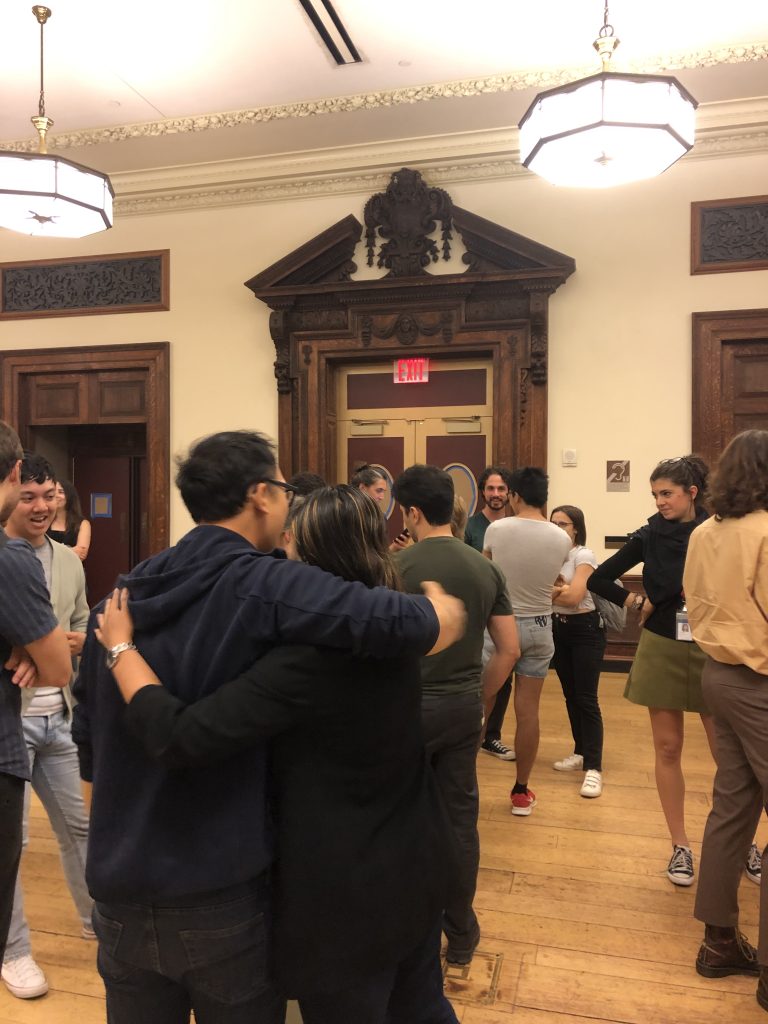Just before 7 p.m. on September 19, a small crowd of postdocs began gathering outside Founder’s Hall. A few sported stickers proclaiming “I Voted Union Yes!” The air was warm and the nervous excitement palpable as the group began to move toward the building, where the vote count for Rockefeller’s postdoc union election was about to take place. “Should we all gasp at each ‘no’ vote?” someone joked, drawing laughter.
Postdoctoral researchers at Rockefeller started planning their union campaign in early 2023, amid a citywide wave of postdoc unionization. Columbia postdocs won their union in 2018 and have since been joined by their peers at Mount Sinai (2022), Weill Cornell (2023), and Einstein (2024). Postdocs at NYU are currently waiting for a decision on the validity of their unit from the National Labor Relations Board (NLRB). This local upswell of union activity facilitated Rockefeller’s campaign: postdocs who had helped organize strong unions at other New York City institutions provided Rockefeller’s organizing committee with training and support. The union officially launched in July 2024 as the United Postdoctoral Researchers of Rockefeller-UAW (UPROR-UAW).
Why are so many academic workers unionizing? Having a union gives postdocs—or graduate students—a say in their working conditions. Unions engage in collective bargaining, a process in which union representatives negotiate with the university administration to establish a contract that defines the terms of their employment, such as salary, benefits, and protections against unfair treatment. Without a union, these terms are decided unilaterally by the administration and can be changed without notice. Commonly cited motivations for unionizing include low pay, job insecurity, and insufficient support for international researchers, who make up more than half of the U.S. postdoctoral workforce in STEM fields. Other postdoc unions in New York City have won substantial increases in salary; “just cause” protections, which prevent arbitrary firing; and protections for parents and international postdocs, including extended childcare leave and reimbursements for visa-related expenses. The union representing the largest number of postdocs and graduate students in the U.S. is the United Auto Workers, or UAW. Affiliating with the UAW aids unionization efforts by giving organizers access to institutional knowledge about how to build a strong academic union, as well as resources like the UAW’s legal counsel and strike fund.
Rockefeller’s union timeline
After several months of internal discussion and meetings with postdoc organizers from unionized institutions in New York City, members of Rockefeller’s organizing committee began speaking to postdocs in each lab to gauge union sentiment and recruit other organizers. In July 2024, UPROR-UAW launched its card drive, during which postdocs signed authorization cards to express their support for union representation. An election is triggered if 30% of workers sign cards; at Rockefeller, participation reached a supermajority of 80%. On August 5, union organizers delivered a letter to President Rick Lifton and Dean Tim Stearns, informing them of postdocs’ intent to unionize, urging the administration to remain neutral and refrain from anti-union activities, and requesting to meet. This is a standard practice—if the administration is cooperative, the timeline for holding an election, bargaining, and approving a contract is much shorter. A combative administration will delay this process but, in doing so, risks generating more support for the union.
The university confirmed receipt of the neutrality letter but did not respond to its contents. On August 15, the organizing committee filed a petition with the NLRB to hold an election, in which eligible postdocs would vote on whether to form a union—i.e., whether to be represented by UPROR-UAW in collective bargaining. Five days later, the administration reached out with a proposal: they would agree to the election, rather than challenging its legitimacy in an NLRB hearing, if the union excluded postdocs paid directly by the Howard Hughes Medical Institute (HHMI) from the bargaining unit. The postdocs in question accepted this condition, allowing the election to take place the following month.
In the weeks leading up to the election, UPROR-UAW engaged with the postdoc community through individual conversations, three town hall events, email updates, and social media posts. The union’s messaging focused on how collective bargaining could make Rockefeller a more equitable place—for example, by winning new rights for international workers, securing family-friendly benefits, and providing access to neutral arbitration for cases of bullying and harassment. In parallel, the administration sent several emails and published an extensive FAQ enumerating existing benefits and resources, with particular focus on the Child and Family Center (CFC), the Postdoctoral Association (PDA), and the university’s grievance procedure. Multiple emails stressed that Rockefeller implemented these resources out of care for postdocs’ welfare, “not because a union told the University to do so.” The FAQ warned that it was “impossible to know” whether pay and benefits would improve or worsen as a result of collective bargaining with the administration.
Union-admin dialogue
Two days before the election, a fourth town hall (technically an “information session”) took place. This event was organized not by the union, but by postdocs who felt that the academic body needed to have “a bigger conversation” about unionization, said Albana Kodra, who moderated the panel alongside fellow PDA member Francesco Gianoli. Kodra noted that while the union and the administration had both been sharing information with postdocs, the two groups were not in communication with each other. (In the lead-up to the election, the university has to be careful not to be perceived as intimidating or manipulating postdocs, especially those involved in unionizing.) The purpose of this panel, then, was to create an open conversation between all three parties: union organizers, university administration, and the broader postdoc community.
Kodra and Gianoli were initially unsure whether the administration and the union would want to participate in a joint event. Each side disagreed with the other’s characterization of what a union could or could not achieve, and many postdoc organizers were hesitant to speak publicly against President Lifton, who was originally slated to be on the panel. Some postdocs also doubted the administration’s commitment to clear communication: in September, the university began sending emails about the unionization effort from postdocunioninfo@rockefeller.edu, which was similar enough to the union’s preexisting email address—info@rockefellerpostdocunion.org—to create confusion about which group was responsible for the messages. Ultimately, however, the session went ahead, thanks to a push by a handful of postdocs who felt that the postdoc community needed more information about the pros and cons of unionization before deciding how to vote.
Despite the tension leading up to it, Kodra and Gianoli described the panel as “very civil.” Engagement was high: postdocs submitted over 100 questions in advance of the event, and by the end of the hour-long discussion, Carson Auditorium was standing room only. The moderators selected a subset of questions that reflected the concerns of both pro- and anti-union postdocs and spanned a range of topics, including the specific goals of the union, the administration’s transparency, and the university’s grievance procedures. The administration, represented by Tim Stearns (Dean of Graduate and Postgraduate Studies) and Virginia Huffman (Vice President for Human Resources), noted that the salary and benefits currently offered to Rockefeller postdocs are among the best in the city. Stearns raised the possibility that a union would “create a more adversarial relationship” between postdocs, faculty, and the administration. The panelists representing the union—Kevin Ng, Shanshan Liu, Ryan Morrill, and Stephen Thornquist—emphasized that unionizing empowers postdocs to negotiate the terms of their employment, rather than having their working conditions determined unilaterally by the university. In addition to preserving or strengthening existing benefits, a union contract can extend new protections to the most vulnerable postdocs, such as temporary visa holders, parents, and those working under abusive advisors.
What matters most to postdocs?
Three issues arose repeatedly: the feasibility of paying postdocs higher salaries, the recent transfer of CFC leadership to Bright Horizons, and the effectiveness of Rockefeller’s harassment reporting procedure. Some postdocs feared that salary increases would force PIs to fire staff or further strain university coffers depleted by the Archibald lawsuit. The lawsuit has not put the university in dire financial straits, Stearns clarified: “Rockefeller remains strong.” He cautioned that while the administration “really [tries] to leverage the available funding…to do the best that we can for postdocs and graduate students,” this funding is “not infinite,” and budget-driven reductions in lab size “happen all over the place.” Liu pointed out that the number of postdocs has not decreased at any unionized institution, even when pay has risen considerably. Salary might not be a focus of negotiations, Morrill added. “We, as a group, democratically decide what our priorities are. If we poll everyone in the bargaining unit and they say, ‘Actually, salary is not that important to us—the most important things to us are childcare access or grievance procedures,’ that is what we will be bargaining for.”
Questions about the CFC highlighted parents’ dissatisfaction with the transition of the center’s management from Rockefeller to Bright Horizons, an external company. Postdocs with children at the CFC characterized the administration’s decision to outsource leadership as unilateral and lacking transparency; one audience member expressed frustration that parents’ requests for a town hall and greater openness about the decision-making process were ignored. Huffman, who founded the CFC, acknowledged that the transition was “very tumultuous” and emphasized her commitment to maintaining a high standard of care. She also noted that the move to Bright Horizons allowed the center to resume its normal hours of operation and did not affect tuition, which is subsidized by 60% on average. In response to comments about insufficient communication, Huffman pointed to the establishment of weekly newsletters and a monthly parent group. However, many postdocs saw the university’s handling of the transition as evidence that their benefits can be changed without notice—something that a union contract would protect against.
Rockefeller’s grievance process was a recurring focus of the discussion. Postdocs expressed concerns that the university’s system for reporting harassment is inadequate and asked why the administration has declined to hire a third-party arbiter after several requests to do so from the Rockefeller Inclusive Science Initiative (RiSI) and the PDA. Stearns explained that third-party anonymous reporting has not been implemented because “it’s very difficult to act on [anonymous] complaints,” but reports made to university officials are kept confidential when legally possible. Subsequent questions centered on the discrepancy between the number of harassment cases reported anonymously in a recent PDA survey and the number of Title IX cases addressed by the university, which may reflect a reluctance to use Rockefeller’s reporting mechanisms. The administration suggested that the survey did not include a “clear definition” of harassment but confirmed that conversations about how to improve the reporting procedure are ongoing.
Kodra and Gianoli felt that the information session was helpful to everybody involved: attendees who were less knowledgeable about the union got a better sense of its goals and priorities, and the administration got to hear postdocs’ concerns directly, not just through a small group of union organizers. “We all want the best for everyone in the community,” Gianoli said, echoing Stearns’s comments during the panel, “but how to get there is the disagreement. It has to be a conversation.”
Union election results
At the vote count in the Great Hall, an agent from the NLRB explained the proceedings. The ballots that had been cast over the previous two days were sealed inside two cardboard boxes. She would open them, read each ballot out loud, and display it to the room. No one spoke as she peeled the tape from the cardboard and upended the boxes, releasing a small mountain of pink paper onto the table in front of her. She shuffled the ballots, then picked one up and unfolded it.
“No.” She turned the paper around to show it to everyone assembled. “Shit,” someone muttered.
The Great Hall remained mostly silent as the vote count continued. Postdocs exchanged raised eyebrows across the room. Some tallied votes on their phones and conferred in urgent whispers. The university’s representatives—Huffman and a lawyer—sat next to the table, their faces impassive. A steady trickle of people entered the hall, both Rockefeller postdocs and supporters from other institutions. As the pile of “yes” ballots grew, the tension eased. Members of the organizing committee smiled at each other; one person started to bounce on the balls of his feet. At 7:35, the NLRB agent placed the last ballot in its stack and consulted her colleague for the final tally.
“The count is 167 yes to 75 no, and the union has won the election.”
The room erupted into clapping and cheers. As people hugged and Huffman made her way toward the door, one of Rockefeller’s union organizers led the crowd in a chant:
“Who’s got the power?”
“We’ve got the power!”
“What kind of power?”
“Union power!”
Next steps
Over the last two months, UPROR-UAW has been gearing up for bargaining. The union recently selected its bargaining committee—seven postdocs who will represent their coworkers in contract negotiations with the administration. Organizers are also conducting bargaining surveys, a process that involves interviewing members of the unit about the issues they would most like to see addressed in a first contract. Based on the results of these surveys, the bargaining committee will develop initial bargaining goals and draft proposed contract articles. Negotiations will not begin before 80% of the unit has completed a bargaining survey; this ensures that the union’s bargaining priorities reflect the majority opinion among postdocs. Once Rockefeller and UPROR-UAW have reached a tentative agreement on all articles, union members will vote on whether to ratify the contract or return to negotiations.
The pace of bargaining depends on how strongly the administration contests the union’s proposed articles and how often bargaining sessions can take place. At Mount Sinai, where sessions were short and infrequent, negotiations lasted fifteen months. Weill Cornell’s postdoc union began bargaining at the end of March and had reached tentative agreements with the administration on twenty-four of forty-three articles as of November 12. Based on these timelines, Rockefeller union organizers expect bargaining to take about a year. Postdocs not on the bargaining committee can get involved by attending UPROR-UAW town halls and issue-specific working groups, observing bargaining sessions, and joining union actions like petitions and rallies. Robust participation throughout the process keeps the bargaining committee in touch with postdocs’ needs and increases the union’s bargaining power, making it easier to negotiate a strong contract.
UPROR-UAW is no longer the newest academic union in New York City. In early October, graduate student workers at Mount Sinai voted overwhelmingly to unionize, and Sinai senior researchers completed their own card drive on November 5. Although Rockefeller graduate students and senior researchers face many of the same issues that motivated UPROR-UAW’s campaign, such as unpredictable increases in housing costs and a lack of support for international scholars, it remains to be seen whether union activity will prove as contagious on Rockefeller’s campus as at other institutions. Scientists inside and outside the university’s gates will be watching with interest as the union moves forward with collective bargaining.
All photos provided by UPROR-UAW and Mia Haraguchi



